Featured
Weibo Watch: The Battle for the Bottom Bed
“The battle for the lower bunk beds” (“下铺之争”) is a reflection of society and generational difference in China, touching upon expectations regarding the respect younger individuals should show the elderly.
Published
12 months agoon
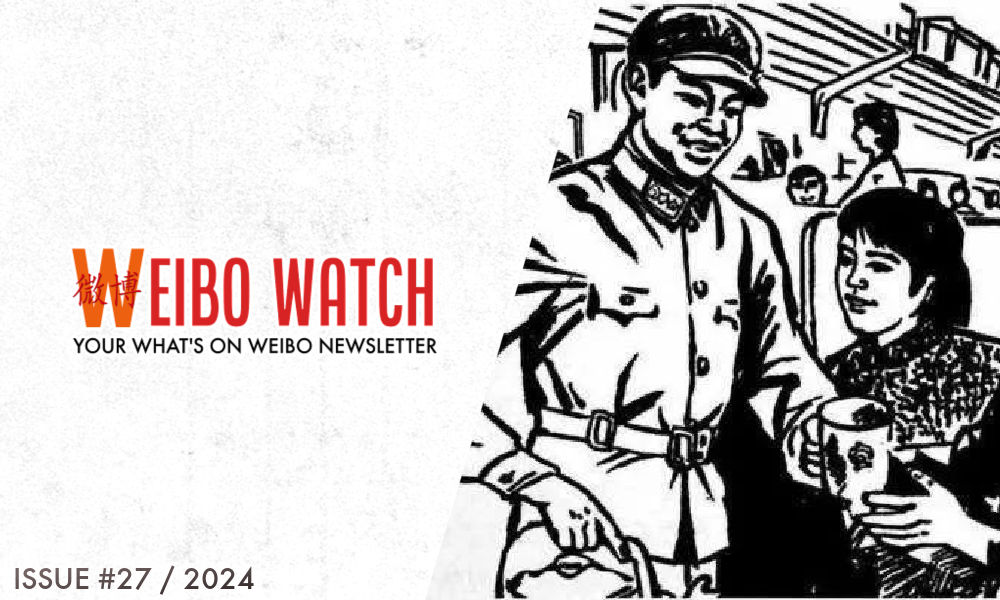
PREMIUM NEWSLETTER | ISSUE #27
This week’s newsletter:
◼︎ 1. Editor’s Note – Battle for the Bottom Bed
◼︎ 2. What’s Been Trending – A closer look at the featured stories
◼︎ 3. What More to Know – Five bit-sized trends
◼︎ 4. What’s the Drama – Top TV to watch
◼︎ 5. What’s Noteworthy – Zara x Haidilao
◼︎ 6. What’s Popular – Martin Garrix x Huang Zitao
◼︎ 7. What’s Memorable – Social media in times of flood
◼︎ 8. Weibo Word of the Week – Coffin rooms
Dear Reader,
Sometime around last summer, a significant debate about train etiquette began trending on Chinese social media. Central to the discussion was a question that attracted over 190 million views on Weibo: Can passengers bring their own “bed curtains”?
The curtains in question (床帘 chuánglián, also 火车遮挡帘 huǒchē zhēdǎnglián) are often used in the cheapest class of sleeper cabins on Chinese trains, known as hard sleepers (硬卧 yìngwò). In these cabins, each compartment features six bunk beds, with three beds on each side separated by a small table. Only the bottom bunk offers sufficient space for seating and is also the most expensive among the three.

Example of Chinese hard sleeper train compartment, image via Sohu.
Train carriages usually comprise 11 semi-open compartments, each featuring a corridor and two foldable seats per cubicle. With so many people in one carriage, noise can become an issue, and privacy can be hard to come by.
“Bed curtains” have emerged as a popular strategy to combat these nuisances, creating a somewhat private and quiet space on trains without disturbance from fellow travelers. Essentially, they are pieces of fabric that can be easily secured above or on the sides of the bunk bed using clips or ropes. These days, Taobao sells them in various colors and patterns.

Bunk bed curtains, sold on e-commerce sites likes Taobao, turn lower bunk beds in a more private space.
Recently, the debate over these curtains reignited on Chinese social media, particularly focusing on how their use creates an additional barrier for other passengers, especially the elderly, to sit on the lower beds. This sparked discussions about whether younger passengers should consider swapping their lower bunk beds with senior passengers, who may find it difficult to access the middle and upper berths, where it’s often impossible for them to sit up straight.
The catalyst for these discussions was a viral video featuring an elderly lady confronting two young people who had hung covers on their bottom bunk beds. She accused them of selfishness for not allowing older passengers with upper bunk tickets to sit on their beds.
Many commenters expressed support for the young passengers in the video, emphasizing that they are not obliged to let other passengers sit on their bed. The topic unleashed a flood of stories of train annoyances about strangers sitting on people’s bottom beds, depriving them of privacy.
The topic further popularized the use of bed curtains, with commenters writing: “I dislike others sitting on my bed but find it difficult to confront them; this is such a clever solution!”
There are currently no explicit regulations prohibiting or allowing these bed curtains, as long as they do not cause inconvenience or block access to other bunks, but many people view them as “uncivilized” and “impolite.”
The online critics of bed curtains often fondly recall their experiences traveling on China’s sleeper trains in past decades. They reminisce about meeting strangers, sharing snacks, playing cards, and forming friendships—experiences characterized by less privacy, but more camaraderie.
As this discussion has been dubbed “the battle for the lower bunk beds” (“下铺之争”), it’s evident that it encompasses more than just seating arrangements. Some say it is a reflection of the current society. It touches upon societal shifts, traditional/cultural expectations regarding the respect younger individuals should show the elderly, and mostly, generational differences.
Unlike the older generations preceding them, Chinese younger generations, products of the one-child policy and growing up amid increasing prosperity, have undergone a significant transformation in their familial roles over the past decades. Not only were they both pampered and pressured to succeed, they also often enjoyed having their own rooms from a young age. Their upbringing has fostered a more individualistic perspective, a heightened emphasis on personal happiness, and a greater value placed on privacy.
Additionally, while previous generations typically ‘served’ their parents, you see that parents often prioritize ‘serving’ their children of younger generations, treating them as equals within the household. This has also led to different views on the interaction between younger and older members of society. Many younger people won’t accept Chinese seniors acting rude or entitled simply because of their age.
The “battle for the bottom bed” essentially symbolizes clashes between different generations. While older generations value communal experiences and respect for elders, younger generations assert their individual rights and prioritize personal space. Given the insufficient seating for all six passengers in current hard sleepers, they argue that it’s China Railways’ responsibility to adapt the layout to better cater to passengers’ needs.
Meanwhile, some Chinese ‘experts’ are cited by media, encouraging young people who have bought lower berths to be understanding and swap with the elderly for their convenience. A related hashtag on the matter was viewed more than 400 million times on Weibo, and the most popular replies basically told the experts to shove their suggestion up theirs. “I have the right to what I pay for,” some said: “If they need a lower bed, let them pay for a lower bed.”
Some bloggers comment that the very fact that this seemingly trivial topic has become such a major topic of debate on Chinese social media is a sign of a “regression in morality.” Some propaganda accounts raise the example of the humble PLA soldier Lei Feng, who would help out other passengers and train staff while traveling, instead of occupying a seat. While most do not expect the same of modern-day travelers, they do think that people, young and old, should show a little more understanding for each other.
In this light, another video garnered attention. It showed an elderly woman on a train politely requesting to swap a top bunk with a young passenger occupying a bottom bunk. The request was made on behalf of her 83-year-old travel companion, and they were happy to compensate for the price difference. That video received praise from netizens, who expressed that it’s the attitude that matters. The young passenger swapped beds with the older lady and did not accept payment for it.
In the end, it’s clear that kindness and empathy are cross-generational, and that communication always helps bridging differences.
In case you don’t feel like bridging differences on your next hard sleeper train, however, here’s the link to the bed curtains.
Warm regards,
– Manya Koetse & Miranda Barnes
What’s Been Trending
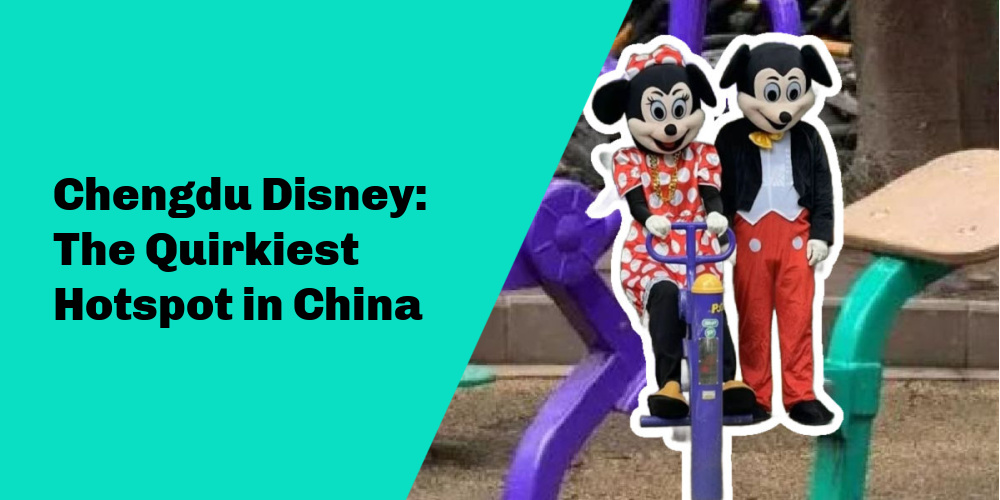
1: Chengdu Disneyland | Chengdu Disney is the latest viral hotspot on Chinese social media, and it’s probably unlike anything you’d imagine. How did an ordinary outdoor senior gym in a local Chengdu neighborhood become nationally known as ‘Chengdu Disney’? By mixing online trends with real-life fun, blending foreign styles with local charm, and adding a dash of humor and absurdity, Chengdu now boasts its very own ‘Chengdu Disney.’ We explain the trend here👇🏼
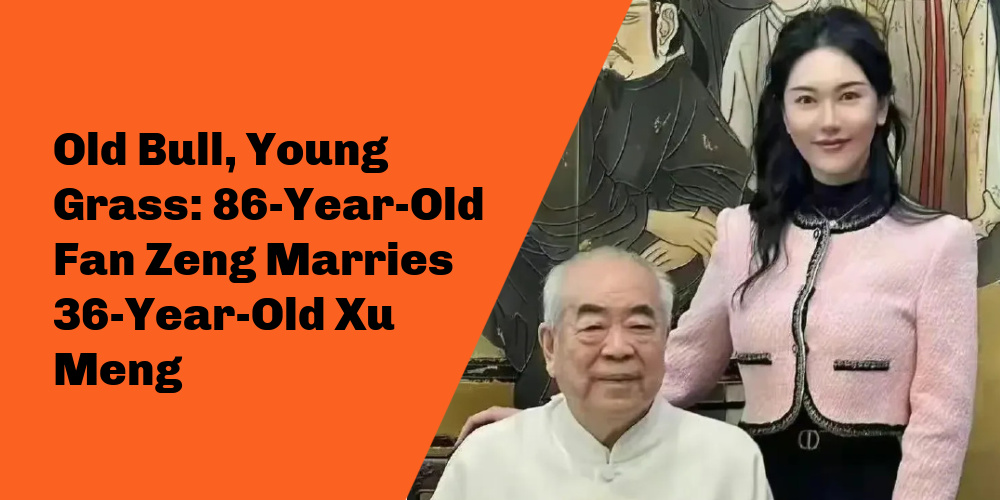
2: Unleashing Flood of Stories | The recent marriage announcement of the renowned Chinese calligrapher/painter Fan Zeng and Xu Meng, a Beijing TV presenter 50 years his junior, has sparked online discussions about the life and work of the esteemed Chinese artist. Some netizens think Fan lacks the integrity expected of a Chinese scholar-artist.
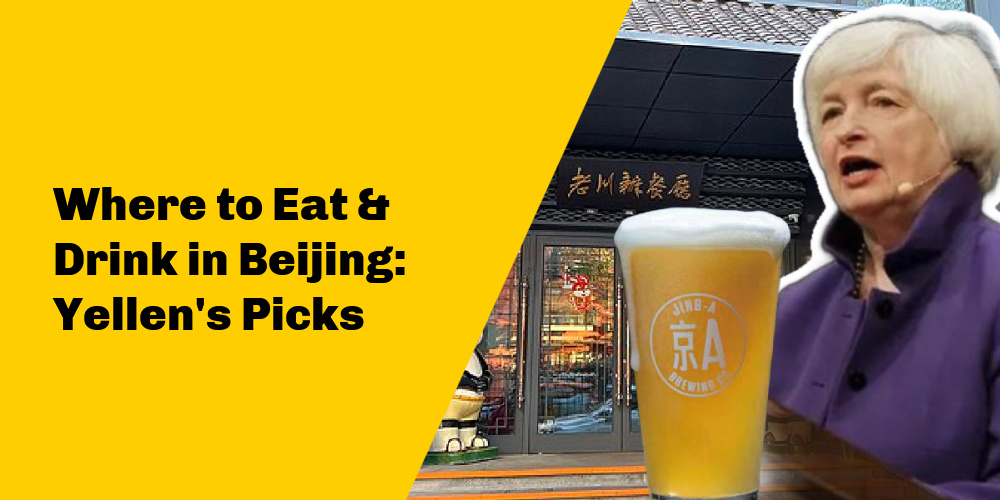
3: Yellen’s Favorites | Earlier in April, Yellen concluded her second trip to Beijing within a year, and once again, it’s not her official talks but rather her choices in food and drink venues that are sparking discussion on social media. From Yunnan classics to fusion cuisine, these are Janet Yellen’s picks for dining and drinking in Beijing.
What More to Know
◼︎ 🌧️ Guangdong Floods | Flooding, landslides, power outages. It’s been a rough few days in Guangdong. From the provincial capital Guangzhou to smaller cities like Shaoguan, Zhaoqing, and Qingyuan, exceptionally heavy rainfall since April 18 has brought significant problems to various areas. At least 4 deaths have been reported, with 10 people still missing. More than 100,000 people have been evacuated. The regions hardest hit are along the Beijiang River, which flooded on April 21. This marks the second flood of the river this year, with the first occurring on April 7, marking the earliest date in the season since floods in major Chinese rivers began being numbered in 1998. As with previous floods, social media is used as a channel to warn people about the ongoing situation, with further rainfall expected. Meanwhile, state media are honoring rescue workers as local heroes, or ‘those going against the tide’ (nìxíngzhě 逆行者).
◼︎ 🌋 Ijen Crater Death | A 31-year-old Chinese tourist tragically lost her life after falling from the edge of Indonesia’s Ijen volcano while attempting to take a photo. She tripped over her own long skirt, plummeting from a height of 75 meters early on the morning of April 20, while the tourists were there to witness the sunrise. With the May 1st holiday approaching, Chinese authorities, through social media, are using this incident as a cautionary tale to warn tourists of the hazards of prioritizing that ‘perfect social media photo’ over personal safety.
◼︎ 💀 Another University Poisoning Case | One recurring case that surfaces on Weibo is that of Zhu Ling, the female victim in the notorious 1995 thallium poisoning incident at Beijing’s Tsinghua University. Although Zhu Ling survived, she was left paralyzed and reliant on her parents for care for the rest of her life. The case remains unsolved, with many pointing to her roommate as the primary suspect. Now, a new suspected poisoning incident at a university has gained attention, following the death of a 25-year-old male student at Xiangtan University due to organ failure after seeking medical treatment. His 27-year-old roommate is currently under suspicion and has been detained. This is a case that is likely to draw further scrutiny in the time to come.
◼︎ 🏃♂️ Marathon Controversy | There was something fishy about the conclusion of the Beijing Half Marathon and the four runners at the finish line. In a video clip that went viral on Chinese social media (see here), viewers observed that three African runners seemed to intentionally slow down to allow Chinese competitor He Jie (何杰) to win the gold medal. Now, the Beijing Half Marathon Organizing Committee has announced the disqualification of all four runners for “breaching the rules of the competition,” nullifying their results, and reclaiming their trophies and medals. The Chinese Athletics Association has also introduced new regulations for discipline management in national events. It appears that the three African runners were “pace setters” who were not intended to be competing athletes, and sponsor/partner Xtep (特步), a sports equipment company, was responsible for not properly identifying them. Consequently, the company has been terminated as a partner. Marathon fraud and the importance of properly regulating major sports events has become a recurring topic on Chinese social media. Last October, the Chinese Athletics Association issued an emergency notice to standardize and regulate China’s national marathon and running events more effectively after Chinese marathon runner Yin Shunjin appeared to be intentionally obstructed by a support vehicle, forcing him to navigate around it and costing him valuable time in the crucial final two minutes of the marathon.
◼︎ 🎲 Little Tuan Tuan Goes to Jail | Popular Chinese influencer “Little Tuan Tuan” (一条小团团), who has millions of followers on the Douyu livestreaming app, became a top trending topic on Chinese social media on April 23 after news came out that she had been arrested. The famous game livestreamer had already stopped airing since last month, but it only now became known that she is suspected of engaging in large-scale illegal gambling activities. In late 2023, Douyu’s chairman and CEO Chen Shaojie was also arrested for allegedly hosting online gambling, which is illegal in mainland China. At the time, state media already reported that the arrest of Chen may lead to a group of top game anchors being implicated due to their involvement in gambling and money laundering. After the earlier arrest of four other anchors, Tuan Tuan is the latest livestream host to be arrested, signaling a zero tolerance approach towards gambling activities in China’s game-focused livestreaming world. Little Tuan Tuan could face up to five years in prison.
What’s the Drama

Best Choice Ever (Chéng Huān Jì 承欢记) is the latest Chinese TV drama hit. Produced by CCTV and simultaneously broadcasted on CCTV-8 and Tencent, it premiered on April 9, and some are already calling it the best romcom drama of the year. This urban family/romance drama centers around the story of Mai Chenghuan (麦承欢), a post-95 young woman living in Shanghai, who is preparing to marry her boyfriend Xin Jialiang (辛家亮), who comes from a wealthy family. However, when Chenghuan’s mum is doing all she can to meddle in their relationship, Mai Chenghuan must break free from her mother’s overbearing influence and focus on her own personal growth.
Noteworthy:
▶️ This drama is based on a book by the same name by Hong Kong writer Yi Shu or Isabel Nee Yeh-su, who is known for the strong, intelligent female characters in her stories.
▶️ The main protagonist is played by the super popular Chinese actress Yang Zi (杨紫), who previously starred in hit series such as Ode to Joy (欢乐颂) and The Oath of Love (余生).
▶️ This series is also airing in Thailand starting from April 29, but you won’t hear Yang Zi speaking Chinese there; the entire show will be dubbed in Thai.
▶️ The Shanghai Culture and Tourism office has also been involved in this production, that features some pretty scenes from around Shanghai, which is drawing in young visitors wanting to visit film locations like the Zhapu Road Bridge and Huaihuai Mansion.
You can watch Best Choice Ever online here (with English subtitles) via YouTube.
What’s Noteworthy
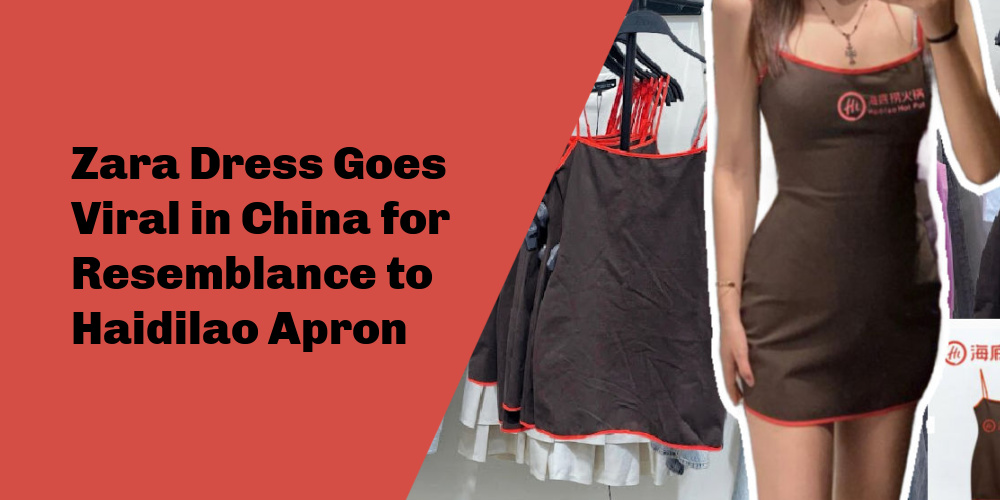
A short dress sold by Zara has gone viral in China for looking like the aprons used by the popular Chinese hotpot chain Haidilao. “I really thought it was a Zara x Haidialo collab,” some customers commented. Others also agree that the first thing they thought about when seeing the Zara dress was the Haidilao apron.
What’s Popular
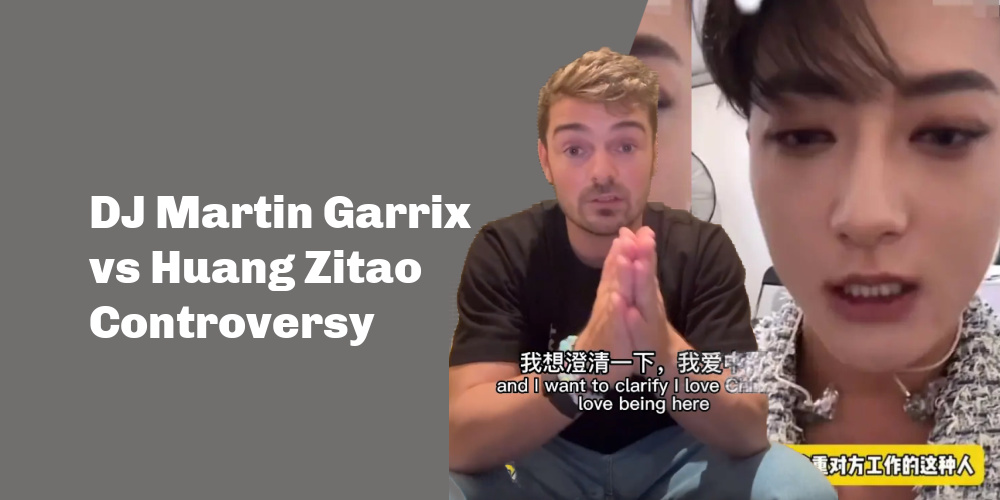
Dutch DJ Martin Garrix found himself embroiled in controversy following the first F1 China Grand Prix Music Festival in Shanghai, which took place from Friday to Sunday. Garrix was allegedly supposed to perform together with Chinese singer Huang Zitao (黄子韬), who initially complained via livestream that the DJ did not show up to their joint rehearsal, and then claimed the DJ showed disrespect by performing his song without him being present on stage. On Weibo, one hashtag about the incident attracted over 160 million views.
Both Huang and Garrix are popular on Weibo, where the Chinese singer has over 66 million fans while the Dutch DJ has more than 360,000 followers.
In response, Garrix promptly posted a video on Weibo refuting what he called “misinformation and lies,” asserting that he and Huang Zitao were never scheduled to perform together. Hearing about Huang’s complaints, he still invited him up on stage, but he never showed up (Garrix claimed he was hiding in the bathroom). Following this, the event organizers issued an apology for the confusion.
Online, opinions remain divided, with some defending Garrix and labeling Huang a “crybaby,” while others support Huang, arguing that Garrix was rude for not wanting to share the stage with the Chinese singer. Either way, it seems the two performers won’t be sharing a beer, nor a stage, anytime soon.
What’s Memorable

This pick from our archive – in light of the current floods – revisits the flood of three years ago. The social media trends during China’s heavy rainfall and floods in Henan in July of 2021 show the multidimensionality of online communication in times of disaster. Facing the devastating downpours, Weibo became a site for participation, propaganda, and some controversial profiting.👇
Weibo Word of the Week

“Coffin Room” | Our Weibo Word of the Week is “Coffin Room” (guāncái fáng 棺材房), or even “Mini Coffin Room” (mínǐ guāncái fáng 迷你棺材房), referring to extremely tiny spaces being rented out at rooms.
The term “coffin room” isn’t new; it previously appeared in mainstream media to describe small cubicles rented out in Hong Kong to people who couldn’t afford larger spaces in the exorbitantly expensive housing market. However, it has recently resurfaced on Chinese social media to describe similarly cramped spaces in Shanghai.
One viral video showcased a rental room of about 5m² (approximately 53.82 square feet) with a makeshift sleeping space right behind a toilet, measuring about two meters long and one meter wide (approximately 6.56 feet long and 3.28 feet wide), all for a monthly rent of 300 yuan ($41). This so-called “coffin room” sparked controversy, with many deeming it absurd and a testament to Shanghai’s overheated housing market. However, the landlord mentioned that the room was already rented out to a Didi driver the day it was posted. See video here.
This is an on-site version of the Weibo Watch newsletter by What’s on Weibo. Missed last week’s newsletter? Find it here. If you are already subscribed to What’s on Weibo but are not yet receiving this newsletter in your inbox, please contact us directly to let us know.
Stories that are authored by the What's on Weibo Team are the stories that multiple authors contributed to. Please check the names at the end of the articles to see who the authors are.

Chinese Language
Chinese New Nickname for Trump Mixes Fairy Tales with Tariff War
From Comrade Trump to the Tariff Beauty, Trump has many nicknames on Chinese social media.
Published
16 hours agoon
April 16, 2025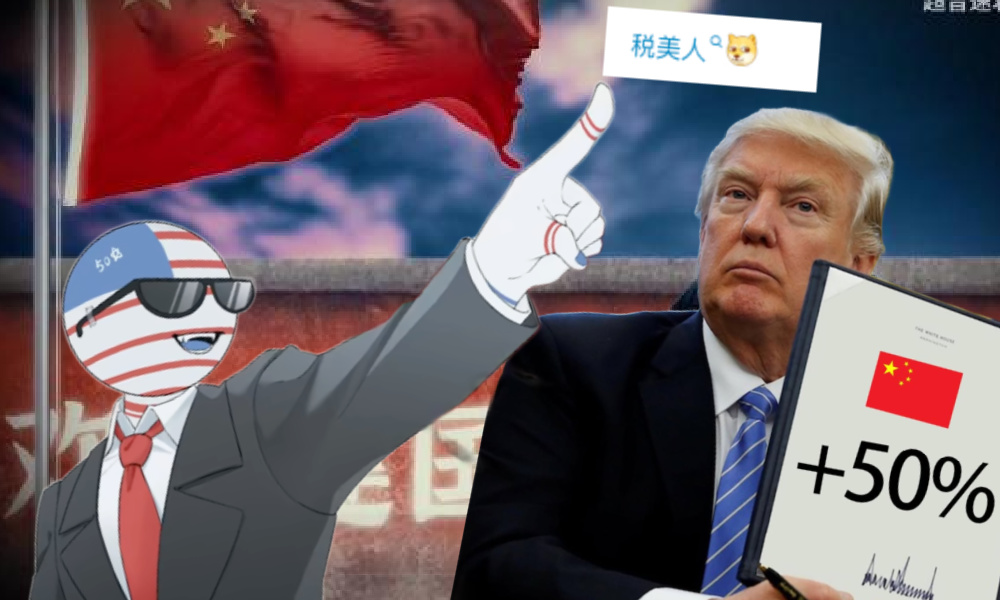
As the tariff turmoil between the US and China continues, President Trump has earned himself a new nickname on Chinese social media.
Over the years, Chinese netizens have come up with many different nicknames for the American President, whose Chinese name is usually transliterated as 川普 Chuānpǔ for phonetic reasons (read more here: Why Trump Has Two Different Names in Chinese).
But Chinese netizens call Trump many other things than just Chuānpǔ. You might have come across nicknames like “Comrade Build the Country” or “Build-the-Country Trump.”
Trump as China’s “Comrade Build-the-Nation”
“Build-the-Country Trump” or “Trump the Nation-Builder” (川建国 Chuān Jiànguó) has been an online joke on Chinese social media for years, often used alongside the related nickname “Comrade Build-the-Nation” (建国同志 Jiànguó Tóngzhì).
The joke began circulating in the early days of Trump’s first presidency in 2017, though even earlier there were humorous memes and satirical stories claiming Trump wasn’t truly American at all — the story goes that he was born in Zigong, Sichuan Province (四川自贡) in China.
When it was confirmed that Trump had won the presidency, proud Sichuan locals joked that he was one of their own, claiming that his Chinese name Chuānpǔ paid homage to their province, as it contained the “Chuan” from “Sichuan” (which literally means “river”). From this, an entire fabricated yet fascinating story about Trump’s Chinese roots emerged.
According to these stories circulating since late 2016, Trump’s father Fred Trump (referred to as Old Trump 老川普) was a businessman who came to China during World War II and stayed until 1947, a year after Donald’s supposed birth. This version of events claims that Old Trump lived through both the Anti-Japanese War and the Chinese Civil War while in China.
The story further claims that the Trump family lived on Guangda Street in Zigong’s Guojia’ao neighborhood (光大街郭家坳), now the site of the Salt Industry Drilling Team’s club. Trump was said to have been born there before leaving China. Zigong is known for its high-quality, expensive salt, and according to the tale, Old Trump shipped this salt to northern China or back to the US, earning a fortune that laid the foundation for the Trump family’s future wealth — and Trump’s eventual rise to the White House.
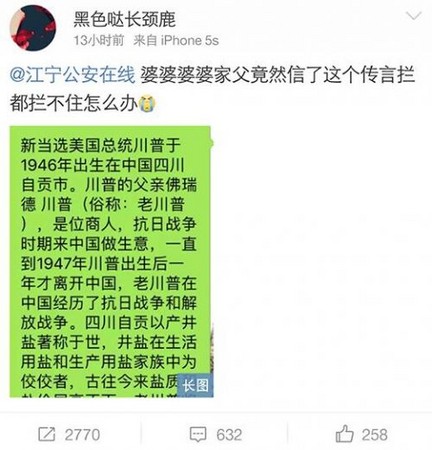
Old screenshot from a Weibo user who found it funny to discover the father-in-law actually believed the fabricated story about Trump being from Sichuan.
What does this entire online fairy tale have to do with Trump’s old nicknames? When Trump was in power, it soon appeared that he was doing all kinds of things that raised eyebrows. He once said that Korea used to be part of China, and then made a series of moves — like withdrawing from the Trans-Pacific Partnership, pulling out of the Paris Climate Accords, and announcing that the US would leave UNESCO — which Chinese netizens saw as a weakening of US global influence, and therefore indirectly as a boost to China’s rising power. The trade war and Trump’s tough stance on Chinese tech companies were also, in a way, seen as forcing China into tech self-reliance, further accelerating the country’s domestic innovation.
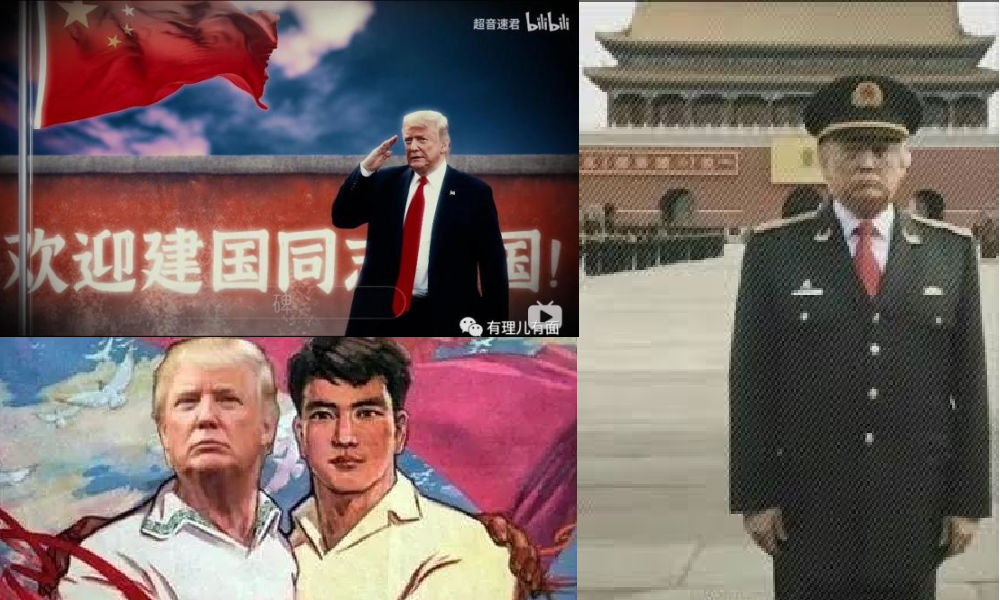
Comrade Trump memes.
All of this combined earned Trump the nickname “Comrade Build-the-Nation,” jokingly fuelling the idea that he was actually China’s ‘secret agent’ on a mission to undermine American imperialism and support China’s rise on the world stage.
Trump the “Tariff Beauty”
Trump’s latest nickname incorporates some of the same sentiments that led to him being jokingly called a “comrade” of China.
Amid ongoing tariff tensions, some Chinese netizens,including some creators of meme-style ‘nation personification’ videos (鬼畜动画) on Douyin and Bilibili, as well as some commenters on Weibo and Xiaohongshu, have started referring to Trump as “税美人” (shuìměirén), which literally means “Tariff Beauty.”

Meme-style videos on Bilibili and Douyin titled “Shuimeiren.”
The nickname is a clever pun, since it sounds exactly the same as the Chinese name for the Sleeping Beauty fairytale: 睡美人 (shuìměirén) (there is also a South Korean 2016 movie of the same name 税美人, Tax Beauty).
What makes the nickname extra catchy is the wordplay: “税” (shuì) means “tax” or “tariff,” and “美” is also an abbreviation for America (from Měiguó, 美国). So, “税美人” not only brings to mind a fairytale princess, but also evokes the idea of “the American who taxes,” perfectly capturing Trump’s dramatic tariff policies in a playful way.
The nickname was especially used in comment sections when Trump began threatening additional tariffs, eventually bringing the total tariffs on Chinese goods to 145% on April 10.
Meanwhile, the “Comrade Trump” meme is more relevant than ever. Both China’s official and unofficial reactions to Trump’s tariffs reflect a general belief that the policies will ultimately harm the American economy and its global influence, while boosting China’s domestic market (also read our latest here).
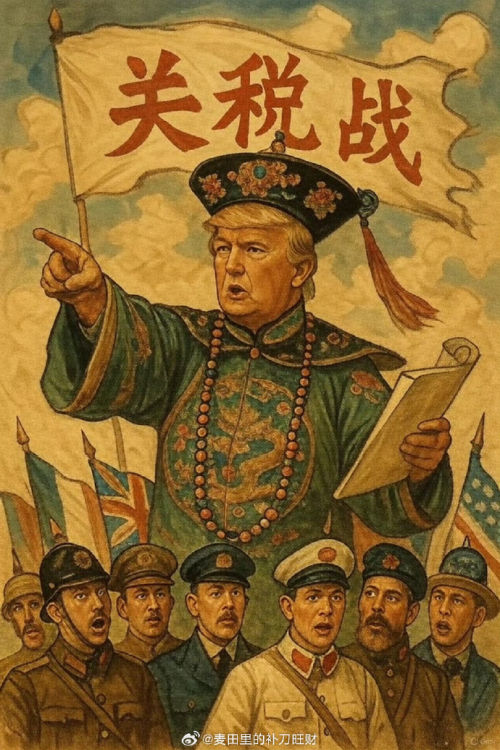
Trump the Tariff Beauty, on Weibo.
On April 16, Harvard University Assistant Professor Moira Weigel published a commentary titled “Long Live Comrade Trump’s Tariffs” in The New York Times, which was later elaborately discussed by Chinese media outlet Guancha.
The article opens by briefly referencing China’s “Comrade Build-the-Nation” meme. Weigel argues that there’s some truth to the sentiment behind the nickname, suggesting that Trump’s tariffs won’t bring manufacturing back to the US, but will instead strengthen China’s position in global e-commerce. She notes that Americans will simply end up paying more for the same goods they’ve always bought, while Chinese companies are accelerating innovation, expanding internationally, and finding clever ways to circumvent tariffs by working with third-party companies and establishing US-based warehousing.
There’s perhaps also another layer to Trump’s new nickname — it also suggests that he is asleep, and, meanwhile, like the “Comrade” meme, is actually hurting the US and strengthening China. One netizen suggested that when it momentarily seemed Trump was backing down by exempting electronic goods from the tariff, a handsome prince had given him a kiss that made him wake up.
But with Trump later declaring that there was no “exception” at all, it seems that the confusion — as well as tariff tensions — are only growing. For now, there’s no happy ending in sight.
By Manya Koetse
(follow on X, LinkedIn, or Instagram)
PART OF WHAT’S ON WEIBO CHAPTER: “THE US-CHINA TARIFF WAR ON CHINESE SOCIAL MEDIA“
Spotted a mistake or want to add something? Please let us know in comments below or email us. First-time commenters, please be patient – we will have to manually approve your comment before it appears.
©2025 Whatsonweibo. All rights reserved. Do not reproduce our content without permission – you can contact us at info@whatsonweibo.com.
China Insight
China Reacts: 3 Trending Hashtags Shaping the Tariff War Narrative
From historic speeches to trending slogans, this is China’s official media response to the US tariff escalation.
Published
4 days agoon
April 13, 2025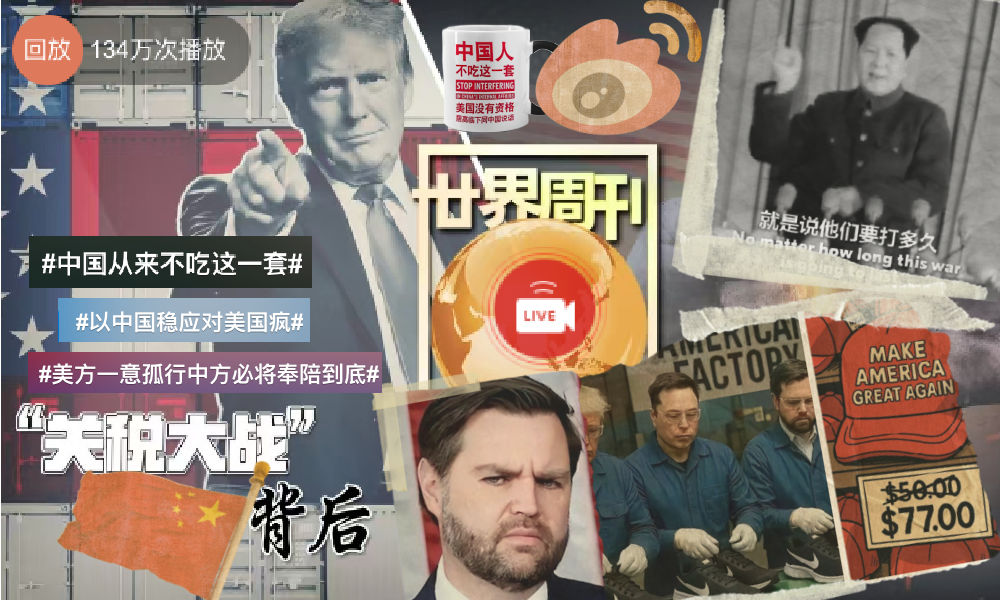
What do Mao’s 1953 Korean War speech and Yang Jiechi’s 2021 Alaska Summit remarks have to do with the escalating US–China trade war? In Chinese official media responses, history and emotionally charged rhetoric are used to clearly signal China’s stance and boost national confidence. Here, we explore three dominant narratives.
As you probably know by now, April 9 marked “D-Day” for Trump’s rollout of steep tariffs. On Chinese social media, the escalating trade war between China and the US dominated conversation, especially on that “D-Day Wednesday,” when nearly all of Weibo’s top 10 most-viewed hashtags were related to Trump’s tariffs and China’s retaliation.
Since developments are unfolding rapidly, here’s a quick recap:
- 🇺🇸💥 On Wednesday, April 2, President Trump announced steep new tariffs, including a universal 10% “minimum base tariff” on all imported goods, and an additional 34% reciprocal tariff specifically targeting China as part of the so-called “Liberation Day,” set to begin on April 9. Combined with pre-existing tariffs, this would bring the total tariff rate on Chinese goods entering the United States to over 54%.
- 🇨🇳⚔️On Friday, April 4, China’s State Council Customs Tariff Commission Office issued an announcement stating that, starting April 10, an additional 34% tariff would be levied on all imported goods originating from the United States, on top of existing tariff rates.
- 🇺🇸⚔️On Tuesday, April 8, Trump vowed to increase tariffs on Chinese exports by an additional 50% if Beijing would not withdraw its 34% counter-tariffs.
- 🇨🇳💥On Wednesday, April 9, China’s finance ministry announced it would further raise tariffs on US goods to 84% starting the following day, in retaliation for the newly imposed 104% tariff on Chinese goods.
- 🇺🇸💣On Wednesday, April 9, Trump then did a U-turn and halted the new steep tariffs for dozens of countries for 90 days, except for China, followed by yet another threat of an additional 21%, bringing those import taxes to 125%.
- 🇺🇸🚨On Thursday, April 10, it was clarified by the White House that tariffs on China would actually total 145%, combining the previously announced 125% with a 20% import tax levied for fentanyl smuggling.
- 🇨🇳💣On Friday, April 11, Chinese official channels reported that China would adjust its tariff measures on important goods from the US starting April 12, raising the rate from 84% to 125%. A related hashtag became no 1 trending topic on Weibo, where it received over 500 million views by Friday night (#对美所有进口商品加征125%关税#).
- 🇺🇸⬅️ On Friday, April 11, Trump’s administration announced that it will exempt smartphones, computers and some other electronic devices from the new tariffs, including the 125% levies imposed on Chinese imports (#特朗普政府再度退缩#; #美国免除智能手机电脑对等关税#).
There are hundreds of hashtags and trending topics circulating across Chinese platforms — from Weibo to Toutiao, from Kuaishou to Douyin — related to the latest developments in the US–China trade war. The topic is super popular, but censored comment sections and removed images also reveal just how sensitive it can be at times.
The biggest hashtags and slogans are those initiated and amplified by official channels. From press conferences to hashtags and visual propaganda, you can see a clear strategic media narrative that draws on history, national pride, and patriotism to frame recent developments, mobilize public sentiment domestically, and show China’s resilience to the rest of the world.
Here, I’ll highlight three hashtags that have recently become top trending, each representing a different kind of official narrative or rhetoric in response to the ongoing developments.
1. China Won’t Back Down
(China will see it through to the end #美方一意孤行中方必将奉陪到底#)
The message that China will not be intimidated by the US is one that echoes across Chinese social media these days, reinforced by official channels.
On April 9, the Weibo account of Chinese media outlet Guancha (@观察者网) and the state-run New Era China Foreign Affairs Think Tank (@新时代中国外交思想库) posted a video showing part of a speech given by Mao Zedong on February 7, 1953, during the final stages of the Korean War at the 4th Session of the 1st National Committee of the Chinese People’s Political Consultative Conference (CPPCC).
In the short fragment, Mao Zedong says:
🇨🇳📢 “As to how long this war will last, we are not the ones who can decide. It used to depend on President Truman, and it will depend on President Eisenhower, or whoever becomes the next US President. It’s up to them. No matter how long this war is going to last, we’ll never yield. We’ll fight until we completely triumph.”
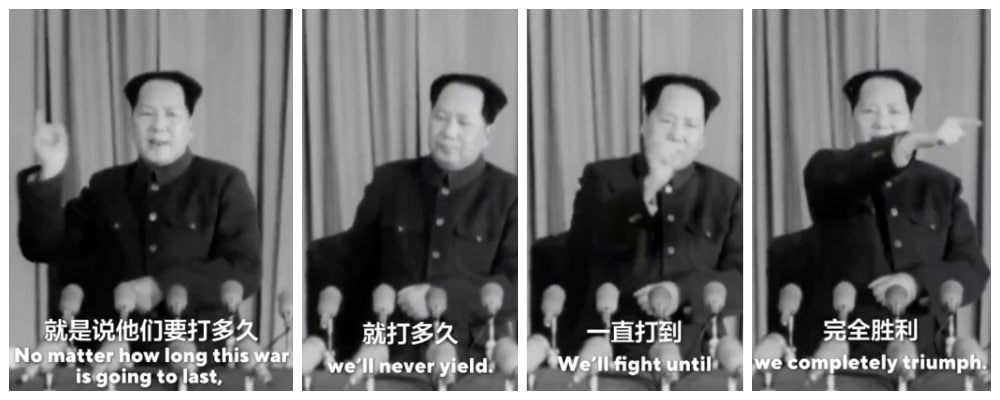
The 1953 speech by Mao was also posted on the US social media platform X by Mao Ning (@毛宁), spokesperson for China’s Ministry of Foreign Affairs. The video was then also spread by blogging accounts and regular netizens. History blogger Zijin Gongzi (@紫禁公子), who has over 435k fans on Weibo, reposted the video, writing:
💬 “Our forefathers never bowed their heads to strong enemies. How could we easily accept defeat? (..) We must not lose this spirit, we must let everyone know that we have a strong backbone and will never bow down.”
Together with the Mao video, the hashtag used by the Think Tank and many other Chinese media accounts, such as People’s Daily (@人民日报), is “If the US obstinately clings to its course, China will fight to the end [lit. accompany them to the end]” (#美方一意孤行中方必将奉陪到底#) and “fight to the end” (#我们奉陪到底#).
These phrases in part come from a press conference given by Ministry of Foreign Affairs spokesperson Lin Jian (林剑) on April 8. Here, he said:
🇨🇳📢 “I want to emphasize once again that there are no winners in trade wars and tariff wars, and protectionism is no way forward. The Chinese people do not provoke trouble, but they are also not afraid. Pressure, threats, and blackmail are not the proper ways to deal with China. China will inevitably take necessary measures and resolutely safeguard its legitimate rights and interests. If the American side disregards the interests of both countries and the international community and insists on waging a tariff war and trade war, China will fight to the end [lit. inevitably accompany them to the end 中方必将奉陪到底].”
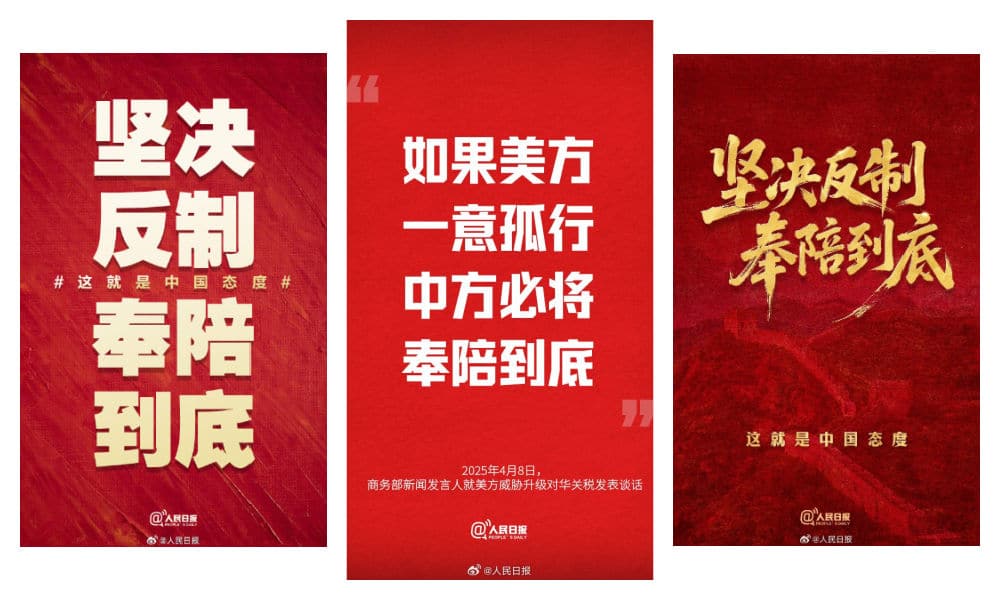
The next day, these words had been turned into digital propaganda posters, with some slight variations in the phrases used. One People’s Daily graphic underlined: “We resolutely take countermeasures, and follow through until the end (坚决反制 奉陪到底),” accompanied by the line: “This is China’s attitude,” which was also turned into a hashtag (#这就是中国态度#).
2. This Is No Way to Deal with China
(Chinese people aren’t buying it #中国人从来不吃这一套#)
Another related yet somewhat different sentiment that dominates Chinese social media—led by official channels—is that China is not only rejecting the trade games played by the US, but is also distancing itself from the American playbook. The message is: this is no way to deal with China. This narrative, and the hashtag surrounding it, emerged slightly later than the first. While the earlier phrase about China not backing down trended as China matched the US in its tariff measures, this one took off with China’s final blow—raising the rate on US imports from 84% to 125% in response to the latest US tariff hikes.
The April 11 statement on the Ministry of Finance website (财政部网站), also posted on Weibo by Xinhua News (@新华社), announced that China would adjust its additional tariff measures on imports originating from the United States effective April 12. It also stated that China strongly condemns the US imposition of excessively high tariffs and will no longer engage in further tariff escalations:
🇨🇳📢 “Given that, at the current tariff level, US goods entering China effectively have no market viability, if the US continues to raise tariffs on Chinese exports to the US, China will no longer respond.”
The main hashtag used by Xinhua and many other media channels is “中国从来不吃这一套” (Zhōngguó cónglái bù chī zhè yī tào), which can be translated as: “The Chinese people have never accepted this,” or more colloquially, “We’re not buying it.”
The phrase initially became popular in 2021, after it was used by China’s top diplomat Yang Jiechi (杨洁篪) during the first major strategic talks of the Biden administration, held in Anchorage on March 19. Due to the occasionally heated exchanges between the two delegations, some called the Alaska talks a “diplomatic clash.”
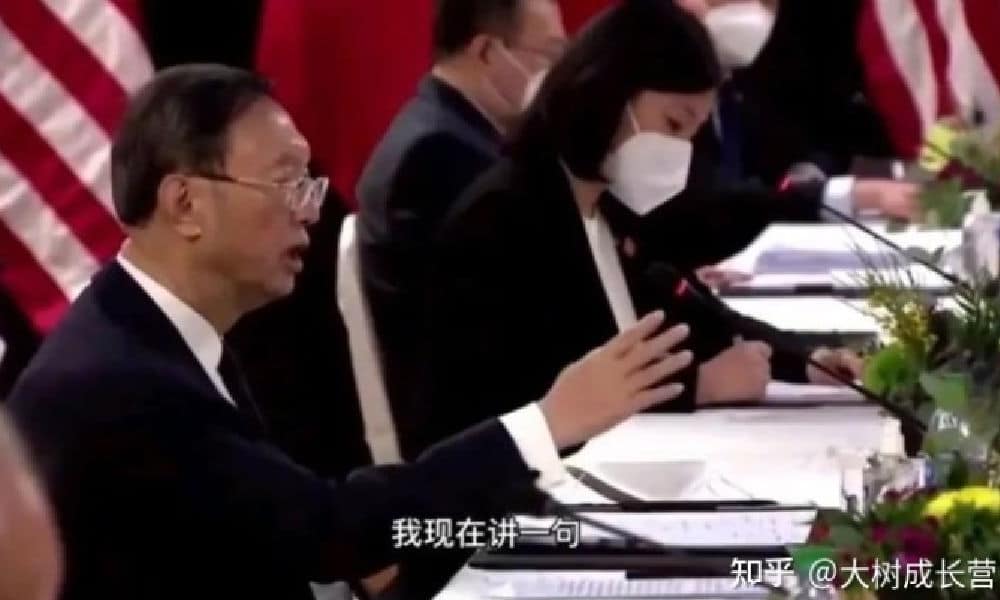
Yang Jiechi during the Alaska Summit
At the time, Yang delivered a lengthy statement to US Secretary of State Antony Blinken and National Security Advisor Jake Sullivan, stressing that Taiwan, Hong Kong, and Xinjiang are “inseparable parts of China,” and that China strongly opposes US interference in its internal affairs. Suggesting the US should focus more on its own human rights issues and racial problems instead of lecturing China, he added the now-famous line: “The US is not qualified to speak to China from a position of strength. The Chinese people don’t buy that” (美国没有资格居高临下同中国说话,中国人不吃这一套).
The phrase quickly went viral—boosted by state media, celebrated by netizens, and turned into a marketing slogan. It now appears on t-shirts, teacups, phone cases, and other patriotic merchandise.
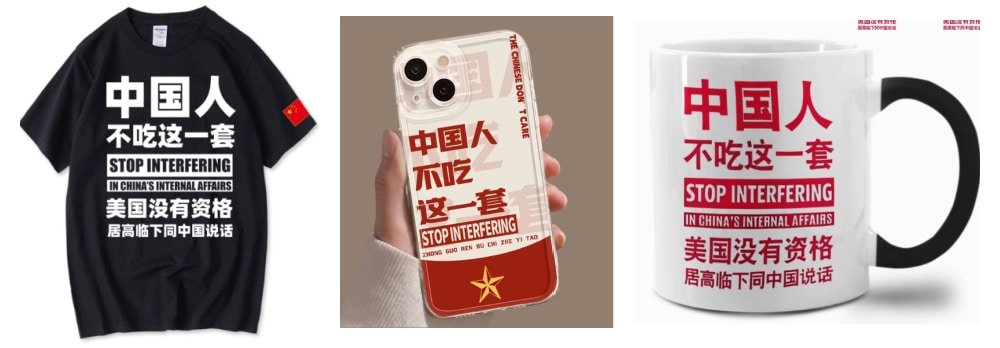
The translation of the phrase still triggers discussions. While merchandise typically translates it as “Stop interfering in China’s internal affairs,” that’s not an accurate translation. During the Alaska Summit, interpreter Zhang Jing (张京) (who gained viral fame at the time) translated it in real-time as “This is not the way to deal with the Chinese people.” However, some commentators and professional translators argued this was a missed opportunity to take a tougher stance, as the Chinese phrase is much sharper and could be loosely translated as: “We Chinese people don’t swallow this crap.”
In Alaska, Yang emphasized that dealing with China requires mutual respect, and that history will prove that trying to strangle China’s rise would ultimately hurt the US itself (“与中国打交道,就要在相互尊重的基础上进行。历史会证明,对中国采取卡脖子的办法,最后受损的是自己。”)
Similar sentiments now dominate online media discourse in China. The slogan has evolved from “The Chinese people don’t buy this” (中国人不吃这一套) to the more authoritative “China has never bought this” (#中国从来不吃这一套#)
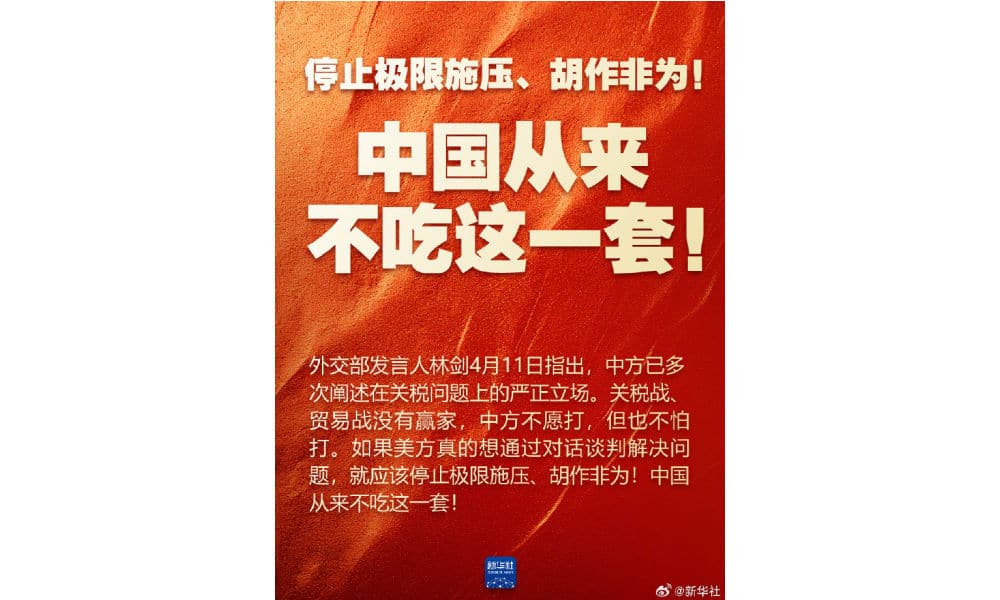
Adding fuel to this message are hashtags like “America’s repeated imposition of excessively high tariffs on China has become a joke” (#美方对华轮番加征畸高关税已沦为笑话#).
Ridiculing America (especially Trump) has become a popular pastime on Chinese social media this past week, with a flood of Chinese and international memes circulating widely.

Especially popular are memes mocking the idea of America as a future “Made-in-America” manufacturing hub, the irony of iconic American products (like MAGA hats) being made in China, and how everyday essentials such as eggs have reached historic price highs in the US (a crisis partly caused by bird flu but now worsened by the tariffs).
On April 13, the hashtag “The 145% tariff makes one panda plush toy cost 80 dollars” (#145%关税让1只熊猫玩偶卖80美元#) also went trending, sparking jokes about how even the most trivial things could suddenly become luxuries in the US.
3. China is the Most Stabile Superpower
(Countering America’s madness with China’s stability #以中国稳应对美国疯#)
A third stance that has been dominant in Chinese official online discourse is that China’s development does not rely on anyone’s favors (#中国发展从不靠谁的恩赐#, derived from a quote by Xi Jinping), and that despite the US’s measures, China’s rise on the world stage cannot be stopped. In fact, the narrative suggests that these actions by the US are only accelerating China’s ascent.
A commentary piece published by state broadcaster CCTV (@央视新闻) on April 11 quoted Professor Li Haidong (李海东) of China Foreign Affairs University, who stated that the US’s increasingly aggressive behavior reinforces the notion that it is using tariffs as a tool of extreme pressure; as a weapon to serve its own interests. According to Li, this reflects America’s hegemonic mindset, aiming to assert superiority by intentionally creating crises.
But rather than strengthening the US, the commentary argues, these recent measures are backfiring and are damaging the US’s domestic economy and undermining its global credibility.
In contrast to the US’s presumed recklessness and “hysterical approach,” China is depicted as a “responsible world leader,” bringing certainty to an uncertain world by “responding with its own stability” and proving to be, supposedly, a more reliable engine of global growth. The commentary states:
🇨🇳📢 “As the tariff storm strikes, China is using its own ‘stability’ to resist the trials and tribulations, by upholding rules, defending justice, and steering the big ship of globalization through treacherous countercurrents, toward the right path of openness and cooperation.”
To promote the piece on social media, CCTV used the hashtag “Responding to America’s madness with China’s stability” (#以中国稳应对美国疯#).
This sentiment was echoed by nationalist bloggers, such as Tangzhe Tongxue (@唐哲同学), who posted on April 13:
💬 “In this world, besides China, the rest are all just a poorly equipped small-town theater troupe (草台班子).”
The phrase “草台班子” (cǎotái bānzi) literally refers to a makeshift opera troupe performing on a shabby rural stage, and is used to describe an incompetent group of amateurs.
The blogger’s comment indirectly responds to comments made by US Vice President JD Vance, who defended Trump’s tariffs in a Fox News interview by saying: “To make it a little more crystal clear, we borrow money from Chinese peasants to buy the things those Chinese peasants manufacture.”
That remark sparked controversy online, with many netizens calling it ignorant. Some pointed out that Chinese people were already wearing fine silks when Westerners were still wrapped in animal skins fishing in the sea, and flipping the narrative to portray Americans as the real “country bumpkins.”

Meme shared online.
This sentiment was reinforced by another hashtag trending on Weibo on April 13: “You think we’re scared, but we actually don’t care” (#你以为我们scared其实我们不care#).
That line comes from a Channel 4 interview with Gao Zhikai (Victor Gao/高志凯), Vice President of the Center for China & Globalization (CCG), who stated:
🇨🇳📢 “China is fully prepared to fight to the very end. Because the world is big enough that the United States is not the totality of the market in the world. So if the United States wants to go in that direction of completely shutting itself out of the Chinese market, be my guest. [Interviewer: Yes and China will lose the US market..] We don’t care. We don’t care. China has been here for 5000 years, and for most of the time there was no United States and we survived. If the United States wants to bully China, we will deal with the situation without the United States. And we except to survive for another 5000 years.”
While this reflects the official position and is widely echoed across social media, others stress the importance of remembering history; particularly China’s “Century of Humiliation” (百年国耻), which was marked by war, aggression, and unequal treaties imposed by foreign powers. Just like other historical anniversaries, some bloggers argue that Trump’s tariff “D-Day,” April 9, should not be forgotten (“今天是每个中国人难以释怀的日子”) and that it marks another reason for China’s renewed rise.
In a video posted by CCTV’s short video platform Xiaoyang Shipin (小央视频) on April 13 (link), the narrator states:
🇨🇳📢 “The so-called global “beacon” now puts “America first.” It slaps allies in the face, treats the world with predatory practices, and makes other countries pay for MAGA, pushing the fragile word economy over the edge, and pitching itself against the whole world. With China here, the sky won’t fall. With around 5% economic growth, China adds the output of a mid-sized European economy every year. China has hundreds of millions of skilled workers. The Chinese people are well known for their strong work ethic. China’s development over the past seven decades is a result of self-reliance and hard work, not favors from others, (..) Global businesses believe the next China is still China and the best is yet to come (..) Markets need to restore faith. Between the pond of closed markets, and the ocean of economic interconnectivity, which one would you choose?”
Overall, packaged across different media — from hashtags to short videos, from press conferences to news reports, and from digital slogan posters to Ministry of Foreign Affairs tweets — China’s strategic political media messaging is clear and quite powerful, despite the fragile and censored environment it operates in: China is not afraid to strike back, China will lead with calm, and eventually, China will emerge as the winner. Whatever happens next remains to be seen, but when it comes to turning crisis into opportunity, China’s official media channels have already done just that.
By Manya Koetse
(follow on X, LinkedIn, or Instagram)
THIS ARTICLE IS PART OF WHAT’S ON WEIBO CHAPTER: “THE US-CHINA TARIFF WAR ON CHINESE SOCIAL MEDIA“
Spotted a mistake or want to add something? Please let us know in comments below or email us. First-time commenters, please be patient – we will have to manually approve your comment before it appears.
©2025 Whatsonweibo. All rights reserved. Do not reproduce our content without permission – you can contact us at info@whatsonweibo.com.
Popular Reads
-

 China Insight11 months ago
China Insight11 months agoThe Tragic Story of “Fat Cat”: How a Chinese Gamer’s Suicide Went Viral
-

 China Digital10 months ago
China Digital10 months agoChina’s 2024 Gaokao Triggers Online Discussions on AI
-

 China Arts & Entertainment11 months ago
China Arts & Entertainment11 months agoSinging Competition or Patriotic Fight? Hunan TV’s ‘Singer 2024’ Stirs Nationalistic Sentiments
-

 China Arts & Entertainment12 months ago
China Arts & Entertainment12 months ago“Old Bull Eating Young Grass”: 86-Year-Old Chinese Painter Fan Zeng Marries 36-Year-Old Xu Meng






